Emergency Dentist Melbourne
Same-Day Appointments & Fast Treatment from a Specialist
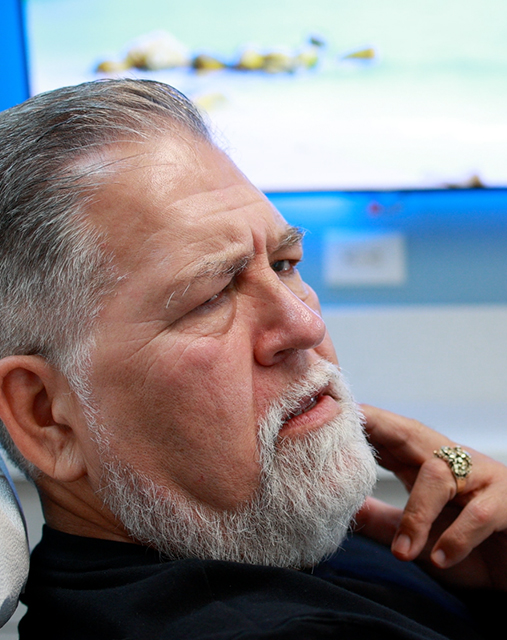
Did a severe toothache keep you awake all night, only to feel exhausted and still in pain the next day during work? Visit Associated Endodontists of Melbourne today to get the expertise you need to not only erase your pain, but also boost your oral health. We use the latest technology, like our GentleWave® system and a powerful microscope, to ensure you receive successful and effective root canal treatment. Call our office today to schedule a same-day appointment and receive the timely treatment you need from an emergency dentist in Melbourne.
Why Choose Associated Endodontists of Melbourne for Emergency Dentistry?
- Same-Day Emergency Appointments Available
- We Accept & Maximize Dental Insurance
- We Offer Oral Conscious Dental Sedation
What Types of Dental Emergencies Can an Endodontist Treat?
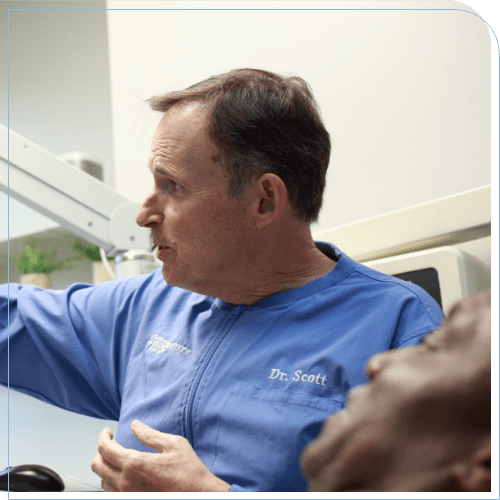
In cases like the following, an endodontist in Melbourne may be the best specialist to see:
- A tooth has been cracked or badly damaged, enough to put the inner pulp at risk.
- A tooth feels sensitive whenever it’s exposed to hot or cold foods or beverages.
- A severe toothache or dental pain is persistent, especially whenever you chew food or bite down on it.
In any of these situations, call our office immediately so we can fit you into our schedule the same day you reach out.
How We Care for Dental Emergencies
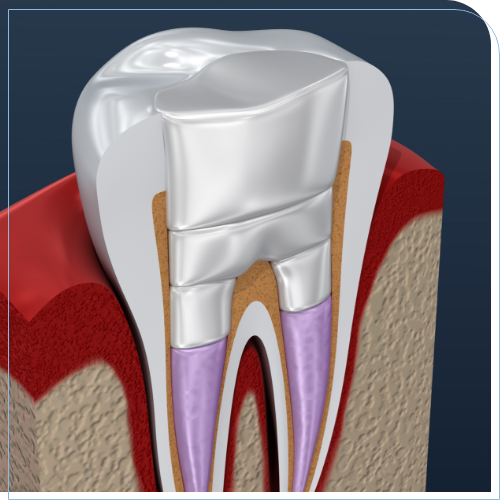
If you’re experiencing tooth pain, call our office immediately to speak with our knowledgeable and friendly front desk staff. They have over a decade of experience helping patients navigate through emergency situations and can provide you with helpful first aid guidance. We also block out a portion of our schedule to accommodate urgent needs with same-day appointments, so we’ll be able to examine and treat you as soon as possible.
Keys to Preventing Dental Emergencies

Although some oral emergencies are completely unavoidable and happen due to circumstances beyond your control, many common problems that lead to urgent issues are avoidable. Improving your dental hygiene habits strengthens your teeth and gums to better resist different concerns, including cavities, gum disease, and injuries that can cause infections or, in severe cases, tooth loss.
Continue reading to learn more about avoiding oral emergencies, and feel free to contact us with additional questions.
Visit Your Dentist Regularly
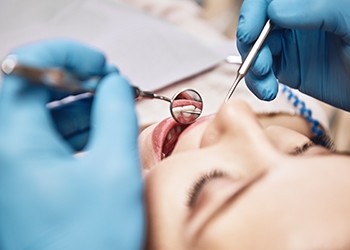
Seeing a general dentist in Melbourne every six months for standard appointments allows them to catch and treat any areas of concern, like thinning enamel or swollen gums, before they worsen. Many providers also screen your soft tissues for signs of oral cancer to avoid this rare but potentially fatal condition.
This keeps your mouth happy and healthy, so you’re less vulnerable to tooth decay, gum disease, and injuries that can become infected and require more complex and costly services to address, like an emergency root canal.
Establish an At-Home Oral Hygiene Routine

Regular dental visits are helpful, but you must also keep your mouth clean between appointments. A consistent at-home hygiene routine is essential for your oral well-being. Brushing and flossing twice daily removes leftover food, plaque, bacteria, and other debris that cause oral issues, including infections.
Eat a Wholesome Diet

Untreated cavities often cause injuries and infection, and certain foods and drinks are known to contribute to their formation. For instance, sugary options attract germs, and overly acidic ingredients can erode your enamel prematurely.
It’s better to eat a wholesome diet containing various vitamins, minerals, and other nutrients that improve your dental and overall health. For example, dairy products like milk, cheese, and yogurt have calcium for strong teeth and bones, and many citrus fruits and leafy greens contain vitamin C to support your connective tissues to resist injuries and illness.
Protect Your Teeth
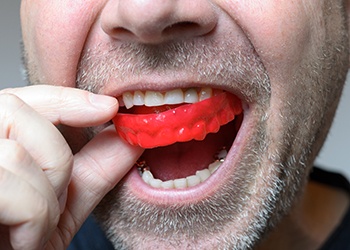
Athletes and others participating in team sports or close-contact physical activities can sustain injuries, like broken teeth, that can become infected if they’re not treated right away. Furthermore, if you unconsciously clench your teeth at night, you might crack or harm them and require endodontic therapy.
Your dentist can provide a custom-fitted mouthguard or nightguard to shield your smile to avoid such damage.
Don’t Use Your Teeth as Tools

Many people don’t stop and think about the damage that can happen to their teeth if they use them to open plastic packaging, mail, bottles, or other containers. Using your teeth on inanimate objects can wear down your enamel, which can eventually be penetrated by bacteria in your mouth.
It’s worth taking a few extra moments to find the appropriate tool for the job, like a letter opener, scissors, or a box cutter.
Understanding the Cost of Dental Emergencies

The cost of dental emergencies in Melbourne will depend on many factors that we can only determine after we’ve had a chance to thoroughly examine your smile, like what type of treatment you require—not every emergency can be solved with root canal treatment!
Not only are we in-network with most major PPO dental insurance plans, but we also offer additional financing through CareCredit to make paying for your treatment as simple and cost-effective as possible. If you have any questions, click the button below to learn more.
Every Dental Emergency is Different

The term “dental emergency” can refer to anything from a single hurting tooth to multiple knocked-out teeth and many situations in between. At Associated Endodontists of Melbourne, our emergency dentists are experts at treating severely infected and painful teeth, but even the cost of treatment here can vary based on the number of teeth that need attention and how severe the infection is. This is all to say that there is no fixed price for emergency dental care.
Does Dental Insurance Cover Dental Emergencies?

Most dental insurance plans do cover emergency care, including endodontic procedures like root canal treatment. The specific amount can vary from plan to plan and might be affected if you’ve met your deductible or yearly maximum. We don’t expect you to read through your insurance plan in the middle of a dental emergency, which is why we’ll just ask you for your membership information in our office. We’ll do the rest as far as verifying your benefits so we can give you an estimate of your coverage.
Other Options for Making Dental Emergencies Affordable

For patients without insurance, our practice gives them the option to break up the cost of their treatment with low-to-no-interest financing through CareCredit. We’ve partnered with them for years, as have countless other healthcare providers around the country. They make it easy to find and select a plan perfectly suited to you in a matter of minutes, allowing you to get the treatments you need without financial stress. You can explore your options and even select a plan by clicking here.
Taking Care of Your Smile Can Save You Money

Of course, in an ideal world, you would never need to visit an emergency dentist in Melbourne. Most of the patients we see are experiencing pain and infection due to a lack of consistent oral care. By brushing your teeth twice a day, flossing once, and visiting your general dentist at least twice a year for checkups, many of the issues that cause people to see us can be largely avoided.
Dental Emergency FAQs
Will my toothache go away on its own?
When you have a headache, in many cases it fades on its own with a little bit of time, patience, and rest. Many people mistakenly assume that toothaches will also resolve themselves eventually, but that’s not usually the case. In fact, most oral issues only worsen progressively the longer you wait to have them addressed.
There are many potential causes for tender teeth, and you’ll need a professional’s help to identify and treat the underlying issue. Contact our office in Melbourne as soon as you notice a problem so we can schedule an appropriate appointment time for you.
Do I need to visit for minor chips to my teeth?
You might think of a minor chip or crack in your enamel as a mere aesthetic frustration, but the truth is, you can’t know for sure how deep the damage extends. Any damage to the structure of your teeth makes it easier for bacteria in your mouth to penetrate the protective outer layer and infect the tender nerves and pulp inside.
Call our office for an appointment, and when you arrive, we’ll examine your mouth and take X-rays or other scans and images to generate a comprehensive picture of your dental health. Then, Dr. Scott can provide a customized treatment plan based on our team’s findings.
Do emergency services hurt?
If you’re already sore with a toothache, abscess, or infection, you might worry that treating it will cause even more pain. Although it’s natural to want to avoid procedures that might hurt, it’s important to remember that root canals often alleviate more aches than they cause. Not only that, but the longer you wait to be seen, the more likely you are to require more complex and costly services to repair the damage.
Our team in Melbourne will do everything we can to help you feel at ease, regardless of the reason for your visit. For example, we can apply a local anesthetic before starting your procedure to avoid potential discomfort. We can also prescribe oral conscious sedation as a pill that you’ll be instructed to take before you arrive, so the effects kick in by the time Dr. Scott begins working.
What should I keep in my emergency dentistry kit?
Keeping a dental emergency kit somewhere easily accessible at home, in your vehicle, in your locker, or at the office ensures that you’ll have all the supplies you need to handle any unexpected oral issues that might occur. Some helpful items to include are:
- Travel-sized toothbrush, toothpaste, and floss so you can stay fresh on the go.
- Sterile gloves.
- Gauze pads and cotton balls.
- Dental cement or temporary filling material.
- Over-the-counter meds like Tylenol and ibuprofen.
- Ice pack.
- Bottled water.
- Contact information for our office.
